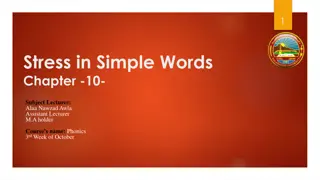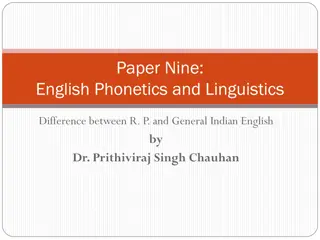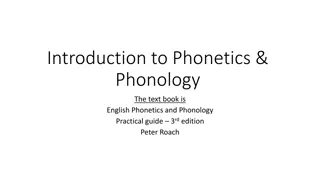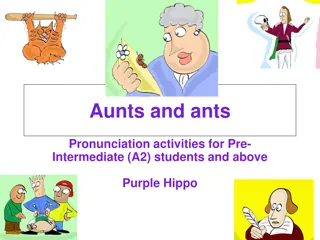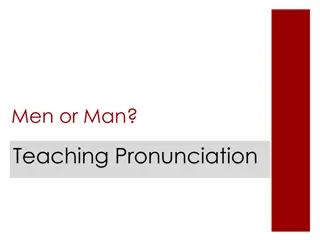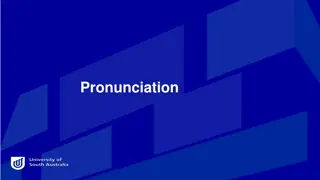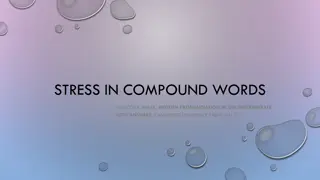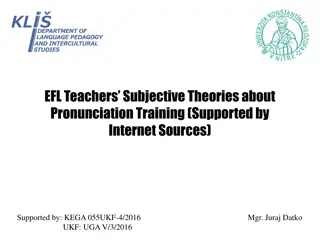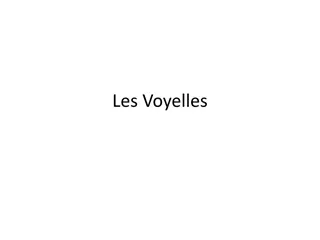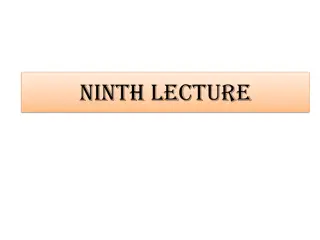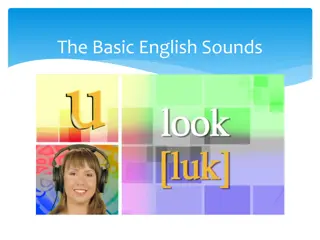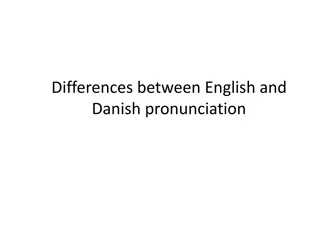Understanding Strong and Weak Forms in English Pronunciation
Exploring the concept of strong and weak forms in English pronunciation, this content discusses the importance of using weak forms in speech, the rules of occurrence of strong forms, and how to recognize the position of weak forms. Examples and explanations illustrate how function words are weakened for rhythm and fluency in spoken English.
Download Presentation

Please find below an Image/Link to download the presentation.
The content on the website is provided AS IS for your information and personal use only. It may not be sold, licensed, or shared on other websites without obtaining consent from the author. Download presentation by click this link. If you encounter any issues during the download, it is possible that the publisher has removed the file from their server.
E N D
Presentation Transcript
1 Weak Forms: Stress on Functional words Chapter -12- Subject Lecturer: Alaa NawzadAwla Assistant Lecturer M.A holder Course s name: Phonics 3rdWeek of November
2 Contents: 1. What are the two groups of English words? 2. What is meant by strong and weak forms? 3. Why it is necessary to use weak forms in speech? Why not only strong forms? 4. What are the rules of the occurrence of the strong forms of function words? 5. How to recognize the position of weak forms?
3 Strong and Weak Forms We have now moved on from looking at syllables to looking at words, and we will consider certain well-known English words that can be pronounced in two different ways; these are called strong forms and weak forms of these words. Example, the word 'that' can be pronounced as / t/ (strong form) or as / t/ (weak form). When we say forms, it basically means shapes , versions or ways of pronouncing some English words; sometimes they are strongly pronounced by giving them strong peak vowels in a sentence and sometimes they are weakly pronounced by giving them weak vowel peaks. Example sentences: But strong form: /b t/ weak form: /b t/ Tell him to go strong forms /h m/ /tu:/ weak form: /tel mt g /
As you can see, the grammatical words him and to are unstressed and have a weak form when pronounced inside a sentence, but when they are used at the end of a sentence, they make strong forms except of to which still makes a weak form but not with schwa but with neutralized /u/ sound. 4 Another example: I would like some fish and chips. Strong forms /a w d la k s m f nd t ps/ This version sounds unnatural and, believe it or not, more difficult to understand for a native speaker. Weak forms / w d la k s m f n t ps/ and we can use weaker forms sometimes: / d la k s m f n t ps/ so we can see that the auxiliary verb "would" has two weak forms /w d/ and /d/. The sentence 'I like that' is pronounced as /aI laIk t/(strong form); the sentence 'I hope that she will' is pronounced as /aI h p t i wIl/ (weak form). There are forty such words with both strong and weak forms in English. It is possible to use only strong forms in speaking, and some foreigners do this. Usually they can still be understood by other speakers of English.
Have a look at the below sentence: 5 The man will open the door at the right time. How many stressed syllables in this sentence? The man will open the door at the right time. / m n l p n d : t raIt taIm / Native English speakers only stress the content words (nouns, verbs, adjectives, adverbs), the smaller words (function words) ,like auxiliary words, articles, and prepositions they get reduced in sound. English is a stress-timed language, which means it is a language where the stressed syllables are said at approximately regular intervals and unstressed syllables shorten to fit this rhythm. Why do grammatical words weaken the way they do?! It's all about rhythm. The way English is pronounced makes it necessary to weaken function words so you can keep the rhythm. Plus, the use of weak forms promote fluency which is an important feature of spoken language.
6 So why is it important to learn how weak forms are used? There are two main reasons: 1. Most native speakers of English find an "all-strong form" pronunciation unnatural and foreign-sounding, something that most learners would wish to avoid. 2. Speakers who are not familiar with the use of weak forms are likely to have difficulty understanding speakers who do use weak forms; since practically all native speakers of British English use them, learners of the language need to learn about these weak forms to help them to understand what they hear.
7 Two Groups of English Words Content words, in linguistics, are words that possess semantic content (they have meaning in isolation) and contribute to the meaning of the sentence in which they occur. In a traditional approach, nouns were said to name objects and other entities, lexical verbs to indicate actions, adjectives to refer to attributes of entities, and adverbs to attributes of actions. Almost all the words which have both a strong and weak form belong to a category that is called function words - words that do not have a dictionary meaning in the way that we normally expect nouns, verbs, adjectives and adverbs to have. These function words are words such as auxiliary verbs, prepositions, conjunctions, etc., all of which are in certain circumstances pronounced in their strong forms but which are more frequently pronounced in their weak forms.
It is important to remember that there are certain contexts where only the strong form is 9 acceptable, and others where the weak form is the normal pronunciation. There are some fairly simple rules; we can say that the strong form is used in the following cases: 1. For many weak-form words, when they occur in the middle of a sentence; for example, the word of has the weak form / v/ in the following sentence: Examples: I'm fond ofchips / aIm f nd v t Ips/ She is fromMorocco / i zfr mm r k / However, when it comes at the end of the sentence, as in the following examples, it has the strong form / V/: Examples: Chips are what I'm fond of / t Ips w t aIm f nd v/ Where is she from? / w3: z i fr m/ Many of the other function words like, ( the , your , a , an , and , but , than , and her ) never occur at the end of a sentence. Some words, like ( she , he , we , you , him , her , them , and us ) do occur in their weak forms in final position.
2. When a weak-form word is being contrasted with another word (a coordinated use of prepositions); for example: 10 Examples: The letter's fromhim, not tohim / let z fr m Im n t tu: Im/ 'I travel to and from London a lot /aI tr v l tu: n fr m l nd n l t/ 'A work of and aboutliterature / w3:k v n ba t lItr t / 3. When a weak-form word is given stress for the purpose of emphasis; for example: Example: 'You must give me more money /ju m st gIv mi m : m ni/ 4. When a weak-form word is being "cited" or "quoted"; for example: Example: 'You shouldn't put "and" at the end of a sentence' /ju d nt p t nd t i end v sent ns/ Another point to remember is that when weak-form words whose spelling begins with 'h' (e.g. 'her', 'have') occur at the beginning of a sentence, the pronunciation is with initial h, even though this is usually omitted in other contexts. Examples: Her car /h ka:/ Take herhome / teIk h m/
11 Weak Form Cases of Function Words 1. the weak forms: / / (before consonants) 'Shut the door' / t d :/ / i/ (before vowels) 'Wait for the end' / weIt f i end/ 2. a , an weak forms: / /(before consonants) 'Read a book / ri:d b k/ / n/(before vowels) 'Eat an apple' / i:t n p l/ 3. and weak form: / n/ (sometimes syllabic /n / if it comes after t, d, s, z, ) 'Come and see' / k m n si:/ 'Fish and chips' / fI n t Ips/
4. but' weak form: It's good but expensive /Its g d b t Ik spensIv/ /b t/ 12 5. 'that': this word only has a weak form when used in a relative clause; when used with a demonstrative sense it is always pronounced in its strong form. Weak form: / t/ The price is the thing that annoys me / praIs Iz I t n Iz mi/ 6. than' Weak form: / n/ 'Better than ever' / bet n ev / 7. 'his' (when it occurs before a noun) weak form: /Iz/ (hIzat the beginning and end of a sentence) 'Take his name' / teIk Iz neIm/ (Another sense of 'his', as in 'it was his', or 'his was late', always has the strong form). 8. her : When used with a possessive sense, preceding a noun; as an object pronoun, this can also occur at the end of a sentence (call her.) Weak forms: / /(before consonants) 'Take her home' / teIk h m/ / r/(before vowels) 'Take her out' / teIk r a t/
9. 'your' weak forms: /j/ (before consonants) 'Take your time' / teIk j taIm/ /j r/ (before vowels) 'On your own' / nj r n/ 13 10. 'she', 'he', 'we', 'you' This group of pronouns has weak forms pronounced with weaker vowels (neutralized) than the /i:/, /u:/ of their strong forms. There is no or little difference in the pronunciation in different places in the sentence, except in the case of 'he'. a) 'she' weak forms: / i/ 'Why did she read it?' / waI dId i ri:d It/ 'Who isshe?' / hu: Iz i/ b) 'he' weak forms: /i/ (the weak form is usually pronounced without h except at the beginning of a sentence) 'Which did hechoose? / wIt dId i t u:z/ 'He was late, wasn't he?' /hi w z leIt w z nt i/ c) 'we weak forms: /wi/ 'How can we get there?' / ha k n wi get e / 'Weneed that, don't we? /wi ni:d t d nt wi/ d) 'you' weak forms: /ju/ 'What do you think?' / w td ju I k/ 'You like it, do you?' /ju laIk It du: ju/
11. him' weak form: /im/ 'Leave him alone' / li:v im l n/ 'I've seen him' / aIv si:n im/ 14 12. 'her' weak form: / / (/h / when sentence-initial) 'Ask her to come' / a:sk t k m/ 'I've met her' / aIv met h / hercar /h ka:/ 13. 'them' weak form: 'Leave them here' / li:v m hI / 'Eat them' / i:t m/ / m/ 14. us' weak forms: / s/ 'Write us a letter' / raIt s let / 'They invited all of us' / eIIn vaItId :l v s/ 15. at' weak form: 'I'll see you at lunch' /aIl si: ju t l nt / / t/ (in final position) what s he shooting at? / w ts i u:tI t/ / t/
16. for' weak forms: /f/ (before consonants) 'Tea for two' / ti: f tu:/ /f r/ (before vowels) 'Thanks for asking' / ks f r a:skI / /f :/ (in final position) 'What's that for? / w ts t f :/ 15 17. 'from' weak form: 'I'm home from work' / aIm h m fr m w3:k/ /fr m/ (in final position) 'Here's where it came from' / hI z we r It keIm fr m/ /fr m/ 18. of weak form: 'Most of all' / m st v :l/ / v/ (in final position) 'Someone I've heard of / s mw n aIv h3:d v/ 19. to' weak forms: /t / (before consonants) 'Try to stop' / traI t st p/ /tu/ (before vowels) 'Time to eat' / taIm tu i:t/ /tu/ (it is not usual to use the strong and weak form /tu:/ or /t / in the final position) 'I don't want to' / aI d nt w nt tu/ / v/
16 20. as' weak forms: 'As much as possible' / z m t z p s bl l/ / z/ (in final position) 'That's what it was sold as / ts w t It w z s ld z/ / z/ 21. some' This word is used in two different ways. In one sense (typically, when it occurs before a countable noun, meaning "an unknown individual") it has the strong form /s m/: 'I think some animal broke it' /aI I k s m nIm l br k It/ It is also used before uncountable nouns (meaning "an unspecified amount of") and before other nouns in the plural (meaning "an unspecified number of"); in such uses it has the weak form /s m/: 'Have some more tea' /h v s m m : ti:/ In final position, some makes a strong form: /s m/ 'I've got some' /aIv g t s m/
17 22. 'there' When this word has a demonstrative function, it always occurs in its strong form / e / (/ e r/ before vowels); for example: 'There it is' / e rIt Iz/ 'Put it there' / p tIt e / Weak forms: / /(before consonants) 'There should be a rule' / dbi ru:l/ / r/(before vowels) 'There is' / rIz/ In final position: the pronunciation may be / / or / e / . 'There isn't any, is there?' / r Iz nt eni Iz /or / r Iz nt eni Iz e / The remaining weak-form words are all auxiliary verbs, which are always used in conjunction with (or at least implying) another ("full") verb. It is important to remember that in their negative form (i.e. combined with 'not') they never have the weak pronunciation, and some (e.g. 'don't', 'can't') have different vowels from their non-negative strong forms. / d nt/ - / ka:nt/
23. 'can', 'could' weak forms: /kn/, /kd/ 'They can wait' / eIk n weIt/ 'He could do it' / hi: k d du: It/ In final position: 'I think we can' /aI I k wi k n/ 'Most of them could' / m st v m k d/ 18 /k n/, /k d/ 24. have', 'has', 'had' weak forms: / v/, / z/, / d/ (with initial h in initial position) 'Which have you seen?' / wIt v ju si:n/ 'Which has been best?' / wIt z bi:n best/ 'Most had gone home' / m st dg n h m/ In final position: /h v/, /h z/, /h d/ 'Yes, we have' / jes wi h v/ 'I think she has' /aI I k i h z/ 'I thought we had' /aI :t wi h d/
19 25. shall', 'should' weak forms: / l/ , / d/ 'We shall need to hurry' /wi l ni:d t h ri/ 'I should forget it' /aI d f get It/ In final position: / l/ , / d/ 'I think we shall' /aI I k wi l/ 'So you should' / s ju d/ 26. must' This word is sometimes used with the sense of forming a conclusion or deduction (e.g. 'she left at eight o'clock, so she must have arrived by now'); when 'must' is used in this way, it is less likely to occur in its weak form than when it is being used in its more familiar sense of obligation. Weak forms: /m s/ (before consonants) 'You must try harder' /ju m s traI ha:d / /m st/ (before vowels) 'He must eat more' /hi m st i:t m :/ In final position: /m st/ 'She certainly must' / i s3:t nli m st/
20 27. do', 'does' Weak forms: 'do' /d / (before consonants) 'Why do they like it?' / waI d eI laIk It/ /du/ (before vowels) 'Why do all the cars stop?' /'waI du ' :l 'ka:z 'st p/ 'does' /d z/ 'When does it arrive?' /'wen d z It 'raIv/ In final position: /du:/, /d z/ 'We don't smoke, but some people do' /'wi: d unt 'sm k b t 's m pi:pl 'du:/ 'I think John does' /aI ' I k 'd n d z/ 28. am', 'are', 'was', 'were' Weak forms: am / m/ 'Why am I here? /'waI m aI 'hI / are / / (before consonants) 'Here are the plates /'hI r 'pleIts/ / r/ (before vowels) 'The coats are in there' / 'k ts r In ' e /
21 was /w z/ 'He was here a minute ago' /hi w z 'hI r 'mInIt 'g / were /w / (before consonants) 'The papers were late' / 'peIp z w 'leIt/ /w r/ (before vowels) 'The questions were easy' / 'kwest nz w r 'i:zi/ In final position: am', 'are', 'was', 'were' / m, a:, w z, w3:/ 'She's not as old as I am' / Iz 'not z ' ld z 'aI m/ 'I know the Smiths are' /aI 'n 'smI s a:/ 'The last record was' / 'la:st 'rek :d W z/ 'They weren't as cold as we were' / eI 'w3:nt z 'k ld z 'wi: W3:/
Quiz 22 Transcribe the function words in the following sentences. 1. I want her to park that car over there. 2. Of all the proposals, the one that you made is the silliest. 3. Jane and Bill could have driven them to and from the party. 4. To come to the point, what shall we do for the rest of the week? 5. Has anyone got an idea where it came from? 6. Pedestrians must always use the crossings provided. 7. Each one was a perfect example of the art that had been developed there.
Words Strong form / i/ when stands before the vowels Ex: They have bought the apples. Weak form / / when stands before the consonants Ex: I dislike the man. 23 The /b t/ stress on the contrast Ex: I m but a fool. / b t/ mention the difference Ex: His girl friend is very beautiful, but is not enough intelligent. But / t/ as a demonstrative pronoun or adjective Ex: Thatis Tom s car. / t/ as a relative pronoun. Ex: I think that we should improve quality of services a lot. That /d z/ stress on the verb of action Ex: She does hope for interview next week. /him/ Ex: This gift was sent to him not to his wife. /h :/ Ex: He loves her but not other girls. /f :/ Ex: A good job is what I looking for. / t/ What are you looking at? /d z/ as a helping verb () Ex: Does she work as a teacher? Does /im/ Ex: I haven t seen him for ages. Him /h / Ex: Her mother is still young. Her /f / Ex: I am looking for a job. For / t/ I ll meet you at the office. At
Transcribe the following Sentences and put the stress on the right words 24 Sentences We can wait for the bus. How do the lights work? There are some new books I must read. She took her aunt for a drive. The basket was full of things to eat. Why should a man earn more than woman? You ought to have your own car. He wants to come and see us at home. Have you taken them from that box? Its true that he was late, but his car could have broken down. I shall take as much as I want. Why am I too late to see him today? Yes, she does, but he doesn t. NO. 1. 2. 3. 4. 5. 6. 7. 8. 9. 10. 11. 12. 13.
25 k ju i end

 undefined
undefined


 undefined
undefined


